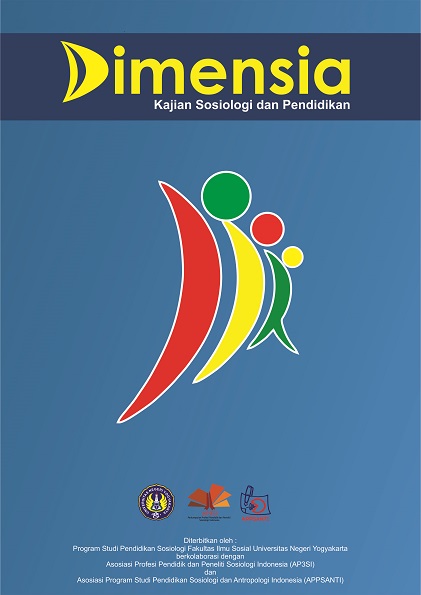KONTESTASI WACANA GOLPUT PADA MEDIA ISLAM MENJELANG PEMILU 2009 Analisis Praktik Kewacanaan pada Majalah Sabili dan Risalah Mujahidin Pasca Fatwa Haram Golput Majelis Ulama Indonesia
DOI:
https://doi.org/10.21831/dimensia.v5i1.3438Abstract
Towards the 2009 National Election of Indonesia, the discourse of the Non-voters or Golongan Putih (often called "Golput") became hot issues in Indonesian mass media. It was then became debate among groups when the Indonesian Ulama Council (MUI) released a fatwa that being non voters is Haram (unlawful). This Fatwa caused controversy among Muslims themselves, since there were support groups and opposed groups in responding this fatwa. This controversy was also accommodated by Islamic media. They have opportunities to construct a discourse through the text which have several tendencies. This study is intended to see and to map out the 2 (two) Islamic medias, Sabili and Risalah Mujahidin in constructing a text after the release of fatwa.
Kata Kunci: Golput, media Islam, praktik kewacanaan
Downloads
Published
How to Cite
Issue
Section
License
Penulis yang menerbitkan jurnal ini menyetujui ketentuan berikut:
- Penulis memegang hak cipta dan memberikan hak publikasi pertama kepada jurnal dengan karya tersebut secara bersamaan dilisensikan di bawah Lisensi Atribusi Creative Commons yang memungkinkan orang lain untuk berbagi karya dengan pengakuan atas kepenulisan karya dan publikasi awal di jurnal ini.
- Penulis dapat mengadakan perjanjian kontrak tambahan yang terpisah untuk distribusi non-eksklusif dari karya versi terbitan jurnal (misalnya, mempostingnya ke repositori institusi atau menerbitkannya dalam buku), dengan pengakuan atas publikasi awalnya pada tahun jurnal ini.
- Penulis diizinkan dan didorong untuk memposting karya mereka secara online (misalnya, di repositori institusi atau di situs web mereka) sebelum dan selama proses penyerahan, karena hal ini dapat mengarah pada pertukaran yang produktif, serta kutipan karya yang diterbitkan lebih awal dan lebih banyak (Lihat The Pengaruh Akses Terbuka).
====================================================
Authors who publish with this journal agree to the following terms:
- Authors retain copyright and grant the journal right of first publication with the work simultaneously licensed under a Creative Commons Attribution License that allows others to share the work with an acknowledgement of the work's authorship and initial publication in this journal.
- Authors are able to enter into separate, additional contractual arrangements for the non-exclusive distribution of the journal's published version of the work (e.g., post it to an institutional repository or publish it in a book), with an acknowledgement of its initial publication in this journal.
- Authors are permitted and encouraged to post their work online (e.g., in institutional repositories or on their website) prior to and during the submission process, as it can lead to productive exchanges, as well as earlier and greater citation of published work (See The Effect of Open Access).







